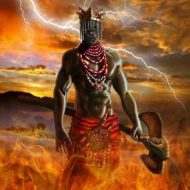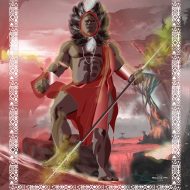Kibuka : The God of War
Listen
At a glance
| Description | |
|---|---|
| Origin | Baganda Mythology |
| Classification | Gods |
| Family Members | Mukasa (Brother), Wanema (Father), Musisii (Grandfather), Nalwaŋga, Nadjemba, Naku (Wife), Lwaŋga, Musoz, Buguŋgu, Kisituka, Kaumpuli, Nairuma, and Nanziri (Children) |
| Region | Uganda |
| Associated With | War |
Kibuka
Introduction
The Baganda, a prominent ethnic group in Uganda, boast a rich and diverse culture interwoven with a complex religious tapestry. Amidst their pantheon of gods and goddesses, one figure emerges as the paramount deity and the guardian of war – Kibuka. Also known as Kibuuka, this formidable deity holds a significant place in Baganda mythology, revered as the god of war and acknowledged as the younger sibling of Mukasa, the god associated with prosperity, fertility, and harvest. Esteemed as a legendary warrior, Kibuka’s stories have endured across generations, becoming an integral part of the cultural heritage of the Baganda people.
Physical Traits
Kibuka is portrayed as a towering and robust figure, characterized by a deep complexion and a lengthy beard. Draped in a scarlet cloak over his shoulders and sporting a horned helmet atop his head, he wields a spear in one hand and a shield in the other. Adding to his majestic presence, a pair of wings adorns his back, granting him the ability to soar through the sky. This physical depiction serves as a visual manifestation of his strength, courage, and authoritative role as the god of war.
Bedecked in the traditional attire of a Baganda warrior, Kibuka’s regal ensemble features a harmonious blend of vibrant hues and intricate patterns, reflecting the cultural aesthetics prevalent in the region. His sharp, focused eyes are believed to cut through the challenges of adversity, underscoring his acute perception and strategic acumen on the battlefield.
Family
Kibuka, the younger sibling of Mukasa, revered as the god overseeing prosperity, fertility, and harvest, shares a divine lineage within the Baganda mythology. Born as the offspring of Wanema, the supreme creator god, and the grandchild of Musisii, the deity associated with earthquakes, Kibuka’s family occupies a central role in the intricate tales of Baganda mythology.
In the realm of divine relationships, Kibuka’s matrimonial ties are as diverse and significant as his familial connections. His three wives, Nalwaŋga, Nadjemba, and Naku, bore witness to the birth of a pantheon of gods and goddesses, contributing to the rich tapestry of Baganda cosmology. Nalwaŋga, the mother of Lwaŋga and Musozi, joined the ranks of Kibuka’s divine offspring. Similarly, Nadjemba, the mother of Buguŋgu and Kisituka, added to the celestial family tree. Naku, Kibuka’s third wife, further expanded the divine lineage by giving birth to Kaumpuli, Nairuma, and Nanziri.
Moreover, Kibuka’s brother, Mukasa, stands among the highest-ranking deities within the pantheon, further elevating the significance of their familial bond. As sons of Wanema and grandsons of Musisii, Kibuka and Mukasa collectively embody the divine essence that governs aspects of prosperity, fertility, harvest, and seismic forces within Baganda cosmology.
Other names
Kibuka is recognized by several alternative names, each shedding light on distinct facets of his character and abilities. These include Kigulu meaning “the one who fights”, Nnamulondo meaning “the one who loves the spear” and Nnakajugo which meant “the one who brings victory”. These names serve as linguistic lenses through which Kibuka’s formidable nature and his capacity to bestow triumph in battle are articulated.
Powers and Abilities
Kibuka stands as the most powerful deity within the Baganda pantheon, wielding a diverse array of powers and abilities. Among these capabilities are his control over fire and lightning, the capacity to induce earthquakes and landslides, the ability to conjure storms and thunderstorms, and the power to summon rainbows and sunbeams. Furthermore, Kibuka exhibits a benevolent side, as he is believed to possess the healing touch, capable of mending wounds and curing diseases. In times of conflict, he emerges as a formidable force, granting victory in battles and providing protection to his devoted followers.
As the god of war, Kibuka’s dominion over power and abilities is even more pronounced. His superhuman strength is legendary, enabling him to achieve remarkable physical feats. Immortality safeguards Kibuka from the grasp of natural mortality, rendering him impervious to death by conventional means. His mastery of war extends beyond sheer strength; Kibuka possesses unparalleled knowledge and expertise in the art of warfare. He can strategize with precision, command armies, and manipulate the very course of battles.
The god of war’s influence isn’t limited to the physical realm alone. Some accounts ascribe to Kibuka the extraordinary power to control the weather, allowing him to summon storms and lightning to aid his forces in the heat of battle. Additionally, Kibuka is occasionally associated with divination and prophecy, presenting him as a sage figure capable of offering guidance and foreseeing the outcomes of impending conflicts. This multifaceted nature further underscores Kibuka’s significance as a deity whose powers extend beyond mere physical prowess, encompassing strategic acumen, weather manipulation, and the ability to guide his followers through divination.
Modern Day Influence
Even in the present day, Kibuka maintains a profound influence on the lives of numerous Baganda individuals, particularly in times of war or conflict. The pivotal figure overseeing these spiritual connections is Kibuka’s chief priest, known as a Jjajja. It is the Jjajja’s solemn responsibility to offer prayers and sacrifices to Kibuka at dedicated temples or shrines, creating a link between the divine and the earthly realm.
Kibuka’s followers, seeking his protective and benedictory energies, adorn themselves with amulets or charms bearing his image or name. These serve as tangible symbols of shelter and blessing, carried as personal tokens of spiritual connection. The vibrancy of Kibuka’s influence extends to festive celebrations, marked by a medley of music, dance, gastronomic delights, libations, games, sports, competitions, parades, and processions. These joyous occasions serve the dual purpose of honoring Kibuka for his illustrious achievements and seeking his favor to address the pressing needs of the community.
The enduring spirit of the warrior is kept alive in the hearts and minds of the Baganda people through the continuation of festivals and rituals dedicated to Kibuka. These communal events not only reinforce cultural ties but also amplify the significance of Kibuka as a guardian figure in both historical and contemporary contexts. Beyond traditional practices, Kibuka’s narratives have transcended the boundaries of time, finding expression in modern avenues such as literature, art, and popular culture. This enduring legacy ensures that Kibuka’s tales resonate with audiences across diverse mediums, solidifying his place not only in ancient mythologies but also in the ongoing narrative of the Baganda community.
Related Images
Frequently Asked Questions
What is lorem Ipsum?
I am text block. Click edit button to change this text. Lorem ipsum dolor sit amet, consectetur adipiscing elit. Ut elit tellus, luctus nec ullamcorper mattis, pulvinar dapibus leo.
What is lorem Ipsum?
I am text block. Click edit button to change this text. Lorem ipsum dolor sit amet, consectetur adipiscing elit. Ut elit tellus, luctus nec ullamcorper mattis, pulvinar dapibus leo.
What is lorem Ipsum?
I am text block. Click edit button to change this text. Lorem ipsum dolor sit amet, consectetur adipiscing elit. Ut elit tellus, luctus nec ullamcorper mattis, pulvinar dapibus leo.
What is lorem Ipsum?
I am text block. Click edit button to change this text. Lorem ipsum dolor sit amet, consectetur adipiscing elit. Ut elit tellus, luctus nec ullamcorper mattis, pulvinar dapibus leo.
What is lorem Ipsum?
I am text block. Click edit button to change this text. Lorem ipsum dolor sit amet, consectetur adipiscing elit. Ut elit tellus, luctus nec ullamcorper mattis, pulvinar dapibus leo.



![Mythlok - Kibuka AI] Mythlok - Kibuka AI]](https://mythlok.b-cdn.net/wp-content/uploads/2023/12/Mythlok-Kibuka-AI-190x190.jpeg)





